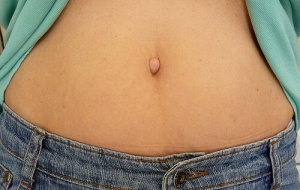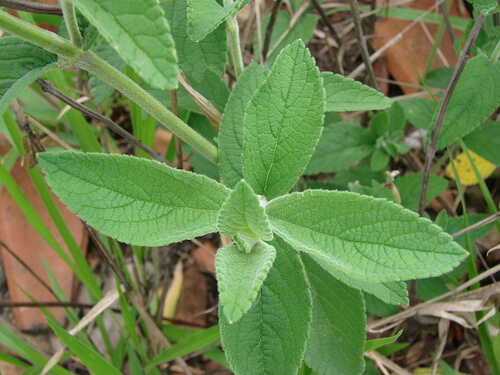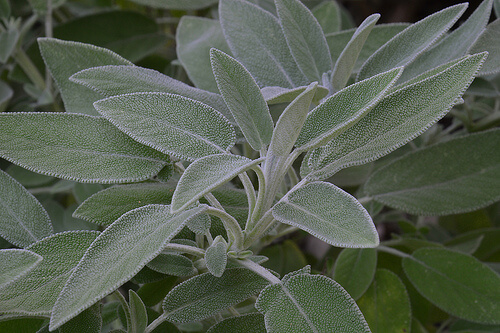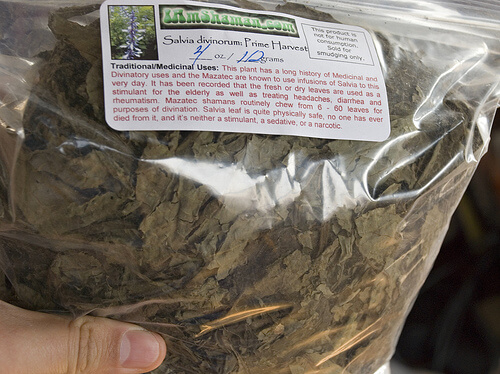Salvia Infusion for a Flat Stomach

Salvia is a plant with many healthy properties. One of them is helping you to get a flat stomach along with the proper diet and exercise, which makes it ideal for weight loss diets. Learn about the benefits of drinking a salvia infusion or tea in the following article.
What to know about salvia
It is a spice with Mediterranean origins, a member of the mint family, and grows like a shrub. The leaves are green and oval shaped, and the flowers are red, pink, and white. It has a long history as a medicinal plant and also as an ingredient for a lot of “potions”. Legend has it that anyone who ate salvia leaves would gain knowledge.
Salvia has a lot of uses from gastronomy to beauty treatments. It is an ingredient in lotions and creams for skin care and also for your hair because of its scent. Some people also use it in meal preparations. Some of salvia’s properties are:
- Anti-inflammatory, which is why it may help relieve muscle pains, rheumatism, and arthritis
- It is astringent
- Salvia is a powerful antiseptic, great for getting rid of throat infections
- It is anti-spasmodic, so you can use it for stomach or muscle spasms
- Fights viruses and bacteria
- Offers a large amount of vitamins A and C
- Strengthens your immune system
- Relieves respiratory and digestive problems
- Helps control blood sugar levels
- Increases sweating because of its drying properties (for fevers)
- Research suggests that it can be useful to relieve menstrual related pains
- Soothes headaches and stomach pain
- Prevents fluid retention
- Boosts wound and ulcer healing
We recommend:
You should know that salvia is contraindicated for women who are lactating and for patients that have kidney failure or neuro-vegetative instability. This is due to the large amounts of thujone, a neurotoxic which can cause convulsions in high doses. It can also cause miscarriages, which is why pregnant women should not consume it.
Why drink a salvia infusion for a flat stomach?
This is a very popular question and it should be cleared up. This plant, which people use in the kitchen and for beauty treatments, also has excellent properties for different illnesses and disorders. Like we said above, this plant may be able to help people who want to achieve a flat stomach.
It is great for women that are on a diet (as well as men) because among salvia’s benefits, there is the fact that it may aid in the regulation process of digestive functions.

Drinking a salvia infusion or tea can prevent and also relieve inflammation caused by stomach problems. Problems such as eating too much food for example (which is known as binging) or eating food that you are not used too ( like fried food, chocolate, etc.).
People also use it to resist the temptation of eating “treats” during a diet, foods that they usually eat in desperation and tend to be too filling.
Check out:
This plant as an infusion can also be helpful to cleanse the body because it helps to get rid of toxins that damage the body.
We should say that salvia has the ability to stimulates the gallbladder, helps fight constipation, promote intestinal movement, and get rid of flatulence, among its many properties.
It can also help you get rid of accumulated gas (one of the reasons why you have a bloated stomach) and facilitate the elimination of retained fluids in the body (especially in the ankles, legs, and feet).
How to make it
Preparing a salvia infusion is truly very simple. Just put 15 grams of the dried or fresh plant (leaves and flowers) per liter of boiling water.
If you like the more natural kinds, you can have a salvia plant in your house (in a flowerpot, the garden, a balcony, or in the kitchen with plenty of sunlight) or just go to a dietary or herbal store and buy dried salvia, as well as any other herbs.
Once you mix the water and salvia, let it sit for three minutes. Then add lemon juice to taste and if you like, you can sweeten this tea with a little bit of stevia or pure raw honey. Its unsweetened flavor can be a little bitter, but it will depend on your preferences.
General recommendations
This amount should last you for three to four days. During this time, you should have a healthy diet besides drink the salvia infusion. Include lots of fruits and vegetables, especially those that help to cleanse and detoxify your body.
You can drink the salvia infusion cold as well as hot. We suggest that you drink it on an empty stomach in the morning to better stimulate your digestive system all day and also to eliminate fats and toxins more effectively.
You can put it in a container with a cover (a bottle or jar, for example), in the refrigerator and drink it as a cold tea when you’re thirsty. You can also make an infusion with less salvia if it’s wintertime and you want to warm up your body up a little or take a break during work.
Images courtesy of zeevveez, Irene Grassi, Joao Medeiros, Seth Anderson and nociveglia.
All cited sources were thoroughly reviewed by our team to ensure their quality, reliability, currency, and validity. The bibliography of this article was considered reliable and of academic or scientific accuracy.
Tepe, B., Sokmen, M., Akpulat, H. A., & Sokmen, A. (2006). Screening of the antioxidant potentials of six Salvia species from Turkey. Food Chemistry. https://doi.org/10.1016/j.foodchem.2004.12.031
Miliauskas, G., Venskutonis, P. R., & Van Beek, T. A. (2004). Screening of radical scavenging activity of some medicinal and aromatic plant extracts. Food Chemistry. https://doi.org/10.1016/j.foodchem.2003.05.007
Kamatou, G. P. P., Makunga, N. P., Ramogola, W. P. N., & Viljoen, A. M. (2008). South African Salvia species: A review of biological activities and phytochemistry. Journal of Ethnopharmacology. https://doi.org/10.1016/j.jep.2008.06.030
Longaray Delamare, A. P., Moschen-Pistorello, I. T., Artico, L., Atti-Serafini, L., & Echeverrigaray, S. (2007). Antibacterial activity of the essential oils of Salvia officinalis L. and Salvia triloba L. cultivated in South Brazil. Food Chemistry. https://doi.org/10.1016/j.foodchem.2005.09.078
This text is provided for informational purposes only and does not replace consultation with a professional. If in doubt, consult your specialist.










